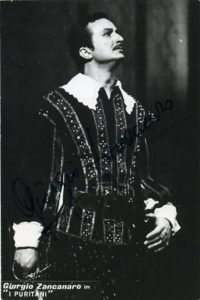
Artist Profile: Giorgio Zancanaro, Elite Verdi Baritone
By David SalazarDuring the later 1900s, there were a few baritones associated with the repertoire of Verdi – the so-called “Verdi baritones.”
While many might immediately turn toward Leo Nucci, Renato Bruson, or Piero Cappuccilli as the big Verdi baritones of the time, Giorgio Zancanaro was undeniably among the elites.
The baritone, born on May 9, 1939, studied in his native Verona, scoring his first major victory when he appeared in the Verdi Competition in Busseto in 1969. In 1970, he made his professional operatic debut in “I Puritani,” and then found himself touring Italy in the repertoire of the legendary composer.
His debut at La Scala came in 1982 when he took on the role of Ford in “Falstaff.” He developed a full-on international career, singing in London, Paris, Vienna, Barcelona, and Zurich, among others.
He debuted at the Metropolitan Opera in 1982, singing for just one season in “Un Ballo in Maschera” and “Il Trovatore.”
While he did not enjoy an extensive recording career, he did appear in some iconic productions, such as “Il Trovatore” and “Andrea Chénier” with Plácido Domingo. He also appeared on a number of recordings under Riccardo Muti, including “La Forza del Destino, “Guglielmo Tell,” “Rigoletto,” “I Vespri Siciliani,” and “Attila,” among others.
Signature Roles
Zancanaro will always be associated with Verdi due to his expressive and elegant manner with the composer’s music. His upper register was beautifully suited to the demands of Verdi’s lines and this is best heard in such works as “Il Trovatore” and “La Forza del Destino.”
Watch and Listen
Here are a few recordings to see the beauty of the baritone’s voice.
First off is “Il Balen del suo sorriso” from “Il Trovatore.”
And here he is in the historic recording of “Attila” under Muti.
Categories
Opera Wiki

